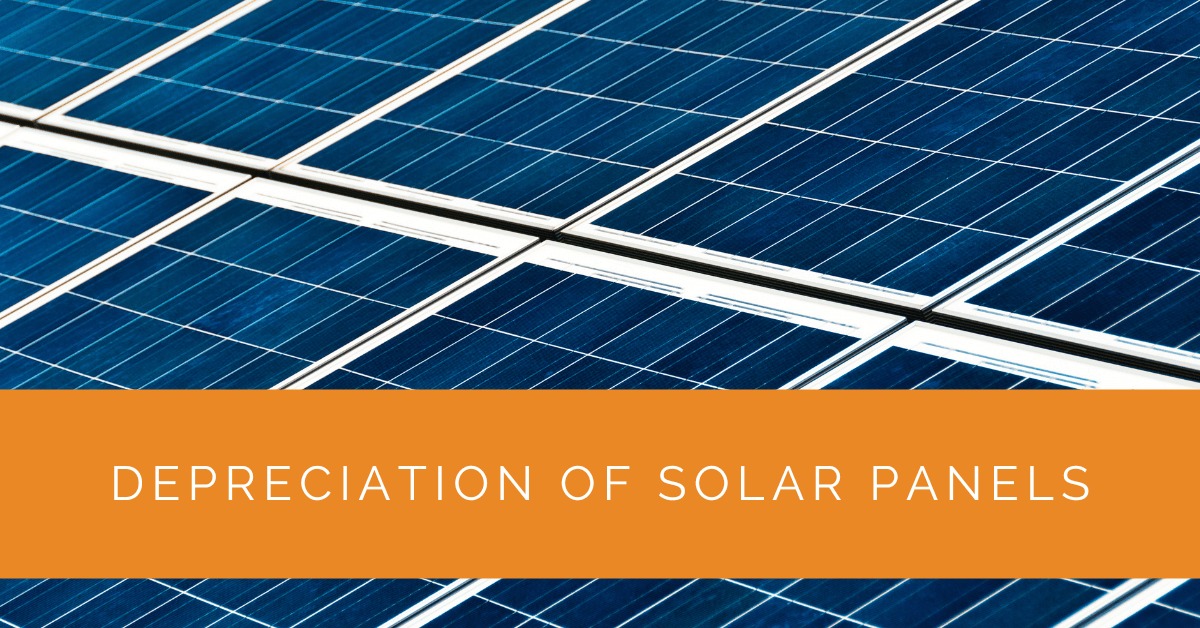As solar energy continues to gain popularity as a clean and renewable energy source, it’s crucial to understand how to maximize the financial benefits of solar panel investments. One key aspect of this is the concept of depreciation, which allows solar panel owners to optimize returns and save on taxes. In this article, we will delve into the details of solar panel depreciation, explore strategies to leverage tax credits and provide valuable insights for residential and commercial solar investments.
Contents
- 1 Key Takeaways
- 2 Solar Panels: A Valuable Asset
- 3 Depreciation Basics
- 4 Federal and State Tax Incentives
- 5 Depreciation Strategies for Solar Panel Owners
- 6 Calculating Solar Panel Depreciation
- 7 Planning for the Future: Depreciation Considerations
- 8 Case Study: Residential Solar Panel Installation
- 9 Expert Insights From Our Solar Panel Installers About Depreciation of Solar Panels
- 10 Experience Solar Excellence with Us!
- 11 Conclusion
Key Takeaways
- Solar panels are valuable assets that provide long-term financial benefits, increased property value, and environmental advantages.
- Understanding depreciation basics, such as the Modified Accelerated Cost Recovery System (MACRS), is crucial for optimizing returns on solar panel investments.
- Leveraging federal and state tax incentives, implementing depreciation strategies, and accurately calculating solar panel depreciation is essential for maximizing financial benefits and minimizing tax liabilities.
Solar Panels: A Valuable Asset
Solar panels represent a significant capital investment for individuals and businesses, providing a reliable and sustainable energy source. To fully understand the financial implications of solar panel ownership, it is important to recognize solar panels as valuable assets. Here’s a closer look at why solar panels are considered valuable assets:
- Long-Term Financial Benefits: Solar panels have a long lifespan, typically 25 to 30 years. By investing in solar panels, individuals and businesses can generate electricity, reducing dependence on traditional energy sources and lowering utility bills. Over time, the savings on energy costs can accumulate, resulting in substantial financial benefits.
- Increased Property Value: Solar panels can enhance the value of a property. Studies have shown that homes equipped with solar panels sell faster and at higher prices than homes without solar installations. This increased property value makes solar panels attractive for homeowners looking to maximize their return on investment.
- Environmental Benefits: Solar energy is a clean and renewable energy source that reduces greenhouse gas emissions and reliance on fossil fuels. Individuals and businesses contribute to a more sustainable future by investing in solar panels while aligning with the growing global focus on reducing carbon footprints.
Depreciation Basics
To effectively manage the financial aspects of solar panel ownership, it is crucial to grasp the basics of depreciation and how it applies to solar panel systems. Here’s a detailed overview of depreciation basics in the context of solar panels:
- Understanding Depreciation: Depreciation refers to the gradual decrease in the value of an asset over time due to factors such as wear and tear, obsolescence, or aging. Solar panel systems are subject to depreciation as their efficiency decreases and newer technologies emerge. Properly accounting for depreciation allows solar panel owners to reflect the reduction in the asset’s value on their financial statements and tax returns.
- Modified Accelerated Cost Recovery System (MACRS): The MACRS is a tax framework established by the Internal Revenue Service (IRS) to determine the depreciation deductions for various types of assets, including solar panel systems. Under MACRS, solar panel systems are classified as 5-year property, allowing for accelerated depreciation deductions. By following the MACRS guidelines, solar panel owners can deduct a significant portion of the system’s cost over a shorter period, reducing their tax liability and improving cash flow.

Federal and State Tax Incentives
The availability of federal and state tax incentives is a key advantage for solar panel owners, enabling them to maximize the financial benefits of their investments. Let’s delve deeper into the federal and state tax incentives related to solar panel depreciation:
- Solar Investment Tax Credit (ITC): The federal government offers the Solar Investment Tax Credit, commonly known as the ITC, which provides a substantial incentive for solar panel owners. The ITC allows eligible taxpayers to deduct a percentage of their solar system’s cost from their federal tax liability. The ITC offers a 30% tax credit for systems installed between 2022 and 2032. This is an increase from the previously planned tax credit rates. Starting from 2033, the tax credit will decrease, decreasing to 26% in 2033 and further reducing to 22% in 2034. No maximum limit on the amount can be claimed under this credit. This credit can significantly offset the initial investment and accelerate the payback period.
- State-Level Incentives: In addition to the federal ITC, many states offer their own tax incentives and rebate programs for solar panel installations. These incentives can vary widely, including state tax credits, grants, rebates, or performance-based incentives. By leveraging both federal and state-level incentives, solar panel owners can further enhance their financial returns and shorten the payback period.
- Tax Cut and Jobs Act: The Tax Cut and Jobs Act, enacted in 2017, introduced significant changes to the federal tax code. While it did not directly impact the ITC, it lowered the corporate tax rate, making the financial benefits of solar panel ownership more attractive for businesses. Furthermore, the act retained the ability to depreciate solar assets using MACRS, ensuring that accelerated depreciation benefits remain intact.
Depreciation Strategies for Solar Panel Owners
Effective depreciation strategies are essential for solar panel owners to maximize their financial returns. The following strategies can be tailored to different types of solar investments:
- Residential Solar Installations: For homeowners, it is important to properly categorize and depreciate their solar system components. Homeowners can allocate depreciation deductions over the system’s useful life by identifying the depreciable assets within the solar installation, such as the panels, inverters, mounting systems, and wiring. Working with a tax professional knowledgeable in solar depreciation can ensure accurate and optimal depreciation strategies.
- Commercial Solar Systems: Commercial solar installations can benefit from bonus depreciation provisions, allowing for accelerated deductions. Bonus depreciation enables businesses to deduct a significant portion of the solar system’s cost in the year it is placed in service. This strategy helps businesses optimize their tax savings and improve cash flow. It is important to consult with tax professionals familiar with commercial solar depreciation and bonus depreciation guidelines to maximize the benefits.
- Utilizing MACRS Depreciation: MACRS provides a structured depreciation schedule for solar panel owners, allowing them to deduct the cost of the solar system over a defined period. Understanding the MACRS guidelines, including applicable recovery periods and depreciation methods, is crucial for accurate depreciation calculations. Software tools and resources are available to assist in determining the depreciation deductions based on MACRS guidelines, ensuring compliance with tax regulations.

Calculating Solar Panel Depreciation
Accurate calculation of solar panel depreciation is vital for optimizing financial returns and tax benefits. Consider the following factors and guidelines when calculating solar panel depreciation:
- Depreciation Factors: Several factors influence the depreciation rate of solar panels. These include the system’s initial cost, installation costs, salvage value, useful life, and the year the system was placed in service. The IRS provides guidelines on the appropriate recovery period and depreciation methods for solar assets.
- Depreciation Schedule: The IRS publishes depreciation schedules that outline the recovery period for different types of solar assets. Solar panels generally fall into the 5-year property category, allowing for accelerated depreciation deductions. By referencing the relevant depreciation schedule, solar panel owners can determine the depreciation deductions for each year of the system’s useful life.
- Online Tools and Resources: Various online tools and resources are available to simplify calculating solar panel depreciation. These tools often incorporate the relevant IRS guidelines, depreciation schedules, and factors specific to solar assets. Solar panel owners can use these resources to ensure accurate calculations while saving time and effort.
Planning for the Future: Depreciation Considerations
Solar panel owners should consider various factors when planning for the future and optimizing their depreciation strategies. Here are important considerations:
- Long-Term Financial Planning: Solar panel ownership involves long-term financial implications. It is essential to factor in depreciation when creating a comprehensive financial plan. Consider the anticipated useful life of the system, potential maintenance and replacement costs, and any future upgrades or expansions. Solar panel owners can make informed decisions to maximize their returns by incorporating depreciation into long-term financial planning.
- Monitoring Tax Laws and Regulations: Tax laws and regulations can evolve, impacting solar panel depreciation and tax incentives. Stay informed about federal and state tax code changes that may affect depreciation rules, tax credits, or other relevant provisions. Consulting with a tax professional can help navigate these changes and ensure compliance with the latest regulations.
- Adapting to Changing Circumstances: Tax brackets, business structure, or ownership changes can impact solar panel depreciation strategies. Regularly reviewing and reassessing your depreciation strategies ensures they align with your current situation and maximize your financial benefits. Stay proactive in adapting your depreciation plans to changes in tax laws, business goals, and any other relevant factors.
- Seek Professional Guidance: Navigating the complexities of solar panel depreciation and tax incentives can be challenging. It is highly recommended to consult with a qualified tax professional experienced in solar energy and depreciation. They can provide personalized guidance, help you navigate the intricacies of tax regulations, and ensure that you make informed decisions to optimize your solar panel investment.
By considering these depreciation considerations and staying proactive in managing your depreciation strategies, you can position yourself for long-term financial success and maximize the benefits of your solar panel investment.
Case Study: Residential Solar Panel Installation
Background
In Tulsa, Oklahoma, Solar Panels Network USA undertook a project to install a residential solar panel system for a local homeowner. The goal was to reduce the homeowner’s dependency on traditional energy sources, lower utility bills, and maximize financial benefits through tax incentives and depreciation strategies.
Project Overview
The homeowner, keen on sustainable living, approached us to design and install a solar energy system that would meet their energy needs and align with their financial goals. The project aimed to leverage federal and state tax incentives, including the Solar Investment Tax Credit (ITC) and the Modified Accelerated Cost Recovery System (MACRS) for depreciation.
Implementation
We began by conducting a thorough site assessment to determine the optimal placement for the solar panels. Considering Tulsa’s sunny climate, we designed a system comprising high-efficiency photovoltaic panels, inverters, and mounting hardware. The system’s design accounted for the home’s energy consumption patterns and future energy needs.
During the installation, our team ensured all components were installed correctly and safely. We also provided the homeowner with detailed instructions on monitoring the system’s performance and maintaining the panels to ensure longevity and efficiency.
Results
Post-installation, the homeowner reported a significant reduction in their monthly utility bills. By utilizing the ITC, they were able to claim a 30% credit on their federal taxes, substantially reducing the initial investment cost. Additionally, the MACRS allowed them to accelerate the depreciation of the solar system, resulting in further tax savings.
The value of the property increased due to the new solar installation, and the homeowner was delighted with the environmental benefits, knowing they were contributing to reducing their carbon footprint.
Summary
The residential solar panel installation in Tulsa, Oklahoma, showcases how leveraging federal and state tax incentives, along with strategic depreciation, can maximize the financial benefits of solar investments. By combining high-quality solar technology with expert installation and maintenance, Solar Panels Network USA delivered a project that met the homeowner’s energy needs and financial goals. This case study highlights our commitment to promoting sustainable energy solutions and helping homeowners achieve long-term financial benefits.
Expert Insights From Our Solar Panel Installers About Depreciation of Solar Panels
As a professional installer, understanding the depreciation of solar panels through the Modified Accelerated Cost Recovery System (MACRS) has been crucial. This allows us to educate our clients on how to maximize their tax benefits while ensuring a sustainable investment.
Senior Solar Installer
Utilizing both federal and state tax incentives has been a game changer for our clients. By leveraging the Solar Investment Tax Credit (ITC) along with state-level rebates, homeowners can significantly reduce their upfront costs and see quicker returns on their solar investments.
Lead Solar Consultant
One of the most important aspects of solar panel installation is helping our clients understand the long-term financial benefits. Not only do solar panels increase property value, but they also offer substantial savings on utility bills over time, making them a valuable asset for any homeowner.
Residential Solar Specialist
Experience Solar Excellence with Us!
Trust in Solar Panels Network USA, where our seasoned experts deliver top-quality solar solutions for homes and businesses nationwide. With a legacy of countless successful installations and a commitment to sustainable energy, we’re your reliable partner in the solar journey. Ready for a brighter, eco-friendly future? Call us now at (855) 427-0058 and harness the power of the sun!
Conclusion
Solar panel depreciation presents a significant opportunity for individuals and businesses to unlock the full potential of their solar investments. By understanding the fundamentals of depreciation, leveraging tax credits, and employing tailored strategies, solar panel owners can enhance their financial returns and contribute to a sustainable future. Make the most of your solar energy journey by incorporating depreciation strategies and maximizing the tax incentives available to you.
Implementing proper depreciation strategies and navigating the complex tax landscape is crucial. Consult with a qualified tax professional to ensure compliance with regulations and optimize your solar panel investment.
Capitalizing on solar panel depreciation and utilizing available tax incentives can transform your solar investment into a financially rewarding and environmentally conscious endeavor.
About the Author
Solar Panels Network USA stands at the forefront of solar energy solutions, driven by a team of seasoned solar engineers and energy consultants. With over decades of experience in delivering high-quality solar installations and maintenance, we are committed to promoting sustainable energy through customer-centric, tailored solutions. Our articles reflect this commitment, crafted collaboratively by experts to provide accurate, up-to-date insights into solar technology, ensuring our readers are well-informed and empowered in their solar energy decisions.

